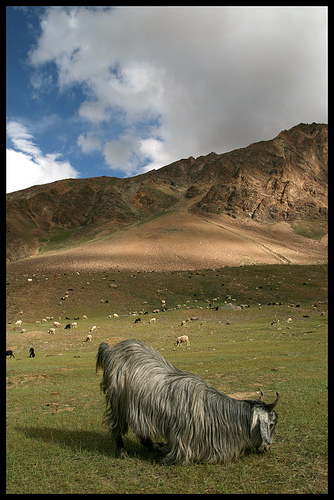Palampur: A new research project worth Rs. 1.39 crore has been sanctioned to the CSK, Himachal Pradesh Agricultural University, under the National Agricultural Innovations Project (NAIP) of the Indian Council of Agricultural Research (ICAR) to undertake research and developmental activities for promoting pashmina production and its efficient utilization in Himachal Pradesh. The project is to be executed in traditional rearing areas of pashmina goats in Lahaul & Spiti and Kinnaur districts along with its introduction to adjoining non-traditional areas. The broad objectives of the project are to augment the productivity and overall production of the pashmina in this region and to ensure its better and efficient utilization so that the traditional goat farmers opt for this activity as an alternate vocation. In such far-flung and climatically harsh areas the livestock based farming systems form the major source of livelihood for local population.

The “Pashmina†also known as “Pashm or Cashmere†is a specialty high-value animal fibre known for its fineness, softness, warmth and luxurious feel and is in great demand in woolen textile industry. This fibre is obtained as a fine undercoat beneath the main hairs from special type of goat breeds distributed at high altitude cold arid regions at altitude above 3000 mts. above mean sea level. These goats are known as Changthangi in Ladhakh and Chegu in H.P. The total Pashmina production in India is hardly about 40 Tonnes / annum constituting less than 0.5% of the total world Pashmina production of approximately 10,000 Tonnes/ annum . China, Russia and Mangolia are the the major Pashmina producing countries of the world.
Another disturbing fact for Indian Pashmina industry is that while the world pashmina production has almost doubled from level of 5000 tonnes in early nineties, the pashmina production in India remained almost static at the level of 35 to 40 tonnes over last almost two decades with Changthang plateau of Ladhakh contributing almost 90 percent of the total production. The average productivity / goat/ annum is very low in India, ranging from 100 to 250 gms against 750 to 1000 gm per annum in countries like China, Russia and Mangolia.
Several constraints like low per animal productivity, static population, high disease prevalence and mortality and obsolete methods in harvesting, collection and processing of pashmina are considered to be the main reasons hampering the growth of pashmina production in the natural habitat of these goats, thus making it a non-vibrant economic activity. The project is envisaged to address these major constraints and help in developing effective interventions at all stages of production system, processing, value addition with due concerns for environmental and social safeguards.
Skill development and capacity building of the scientists and other stakeholders like producers, artisans ( weavers, spinners) and processors is other important component of the project for better adoption of recent techniques. Effective linkages with other developmental agencies in the areas, state Deptt. of Animal Husbandry, State Wool Marketing Federation and private processors will also be ensured for effective implementation of the project.
The sanctioned project is a component of a comprehensive project entitled “A value chain on enhance productivity and profitability of the Pashmina fibre†to be executed in a Consortium mode at total sanctioned cost of Rs 9.43 crore to Sher-e-Kashmir University of Agricultural Sciences and Technology of Kashmir (SKUAST-K), Srinagar is the consortium leader with CSK HPKV, Palampur, Central and Wool Research Institute, Avikanagar (Raj.) and Sheep Husbandry Deptt. , Kashmir (Leh) being the consortium partners.
Dr.Tej Partap,Vice-Chancellor, has appreciated the efforts of university scientists for getting this project sanctioned.
Photo By: Calinore.
A senior journalist from Palampur.



Good luck for the project
Sir may i know this project is different from the joint project of cloning of pasmina goat in colabration with NDRI.